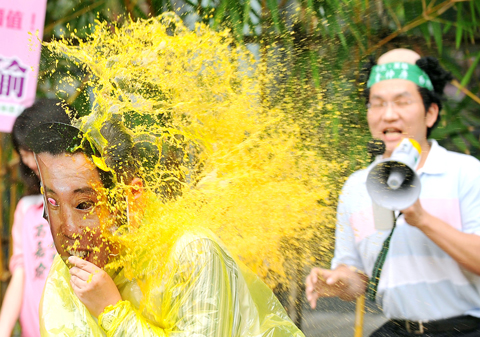Blood serum and plasma imported from China will not be used for the purpose of transfusions in Taiwan, the Department of Health (DOH) assured the public on Friday. The announcement was made in response to lawmakers’ concerns after the Ministry of Economic Affairs (MOEA) allowed the opening up of the nation’s blood market to blood from China, which has one of the fastest-growing AIDS rates in the world.
The DOH said Chinese-imported blood serum and plasma are to be used only for in-vitro diagnostic tests and are banned from being used for blood transfusions or for human use.
“The public has nothing to worry about. All serum and plasma imported from China can only be used as a raw material for the purpose of in-vitro diagnostic tests for hepatitis B and AIDS,” Bureau of Medical Affairs director Shih Chung-liang (石崇良) told a press conference, adding that all imported blood must undergo close inspection and obtain approval from the DOH before entering the Taiwan market.

PHOTO: LIU HSIN-DER, TAIPEI TIMES
Shih said that as a part of the application for DOH approval, all biotech companies that intend to import plasma must provide documentation that proves the origin of the sample, and that the samples must have tested negative for various infectious viruses, in line with WHO protocols.
Furthermore, Shih said, the law requires that all blood, serum and plasma to be used for blood transfusions must be extracted in Taiwan.
On Friday, Democratic Progressive Party Legislator Wen Chin-chu (翁金珠) chided the MOEA for putting the nation’s health at risk by approving the imports of serum and plasma from China despite the fact that malaria is endemic in some parts of China.
Reported cases of HIV and AIDS in China have escalated rapidly in recent years, she said.
“The DOH said Taiwanese citizens who have traveled to malaria-affected regions in China are not allowed to donate blood for one year after their visit. However, the government has clandestinely opened up Taiwan to blood from China,” she said, adding that she suspected some high-ranking officers are behind the deal for personal profit.
USAIDS said China’s HIV epidemic remains fairly low, but added that there are pockets of high infection among specific sub-populations and in some localities.
Estimates on the organization’s Web site show that by the end of 2007, approximately 700,000 Chinese were HIV positive. The HIV infection rate among China’s population is 0.05 percent.
An estimated 85,000 Chinese have AIDS and of those, 35,000 have been infected through commercial blood donations and transfusions.

Rainfall is expected to become more widespread and persistent across central and southern Taiwan over the next few days, with the effects of the weather patterns becoming most prominent between last night and tomorrow, the Central Weather Administration (CWA) said yesterday. Independent meteorologist Daniel Wu (吳德榮) said that based on the latest forecast models of the combination of a low-pressure system and southwesterly winds, rainfall and flooding are expected to continue in central and southern Taiwan from today to Sunday. The CWA also warned of flash floods, thunder and lightning, and strong gusts in these areas, as well as landslides and fallen

WAITING GAME: The US has so far only offered a ‘best rate tariff,’ which officials assume is about 15 percent, the same as Japan, a person familiar with the matter said Taiwan and the US have completed “technical consultations” regarding tariffs and a finalized rate is expected to be released soon, Executive Yuan spokeswoman Michelle Lee (李慧芝) told a news conference yesterday, as a 90-day pause on US President Donald Trump’s “reciprocal” tariffs is set to expire today. The two countries have reached a “certain degree of consensus” on issues such as tariffs, nontariff trade barriers, trade facilitation, supply chain resilience and economic security, Lee said. They also discussed opportunities for cooperation, investment and procurement, she said. A joint statement is still being negotiated and would be released once the US government has made

SOUTH CHINA SEA? The Philippine president spoke of adding more classrooms and power plants, while skipping tensions with China over disputed areas Philippine President Ferdinand Marcos Jr yesterday blasted “useless and crumbling” flood control projects in a state of the nation address that focused on domestic issues after a months-long feud with his vice president. Addressing a joint session of congress after days of rain that left at least 31 dead, Marcos repeated his recent warning that the nation faced a climate change-driven “new normal,” while pledging to investigate publicly funded projects that had failed. “Let’s not pretend, the people know that these projects can breed corruption. Kickbacks ... for the boys,” he said, citing houses that were “swept away” by the floods. “Someone has

‘CRUDE’: The potential countermeasure is in response to South Africa renaming Taiwan’s representative offices and the insistence that it move out of Pretoria Taiwan is considering banning exports of semiconductors to South Africa after the latter unilaterally downgraded and changed the names of Taiwan’s two representative offices, the Ministry of Foreign Affairs (MOFA) said yesterday. On Monday last week, the South African Department of International Relations and Cooperation unilaterally released a statement saying that, as of April 1, the Taipei Liaison Offices in Pretoria and Cape Town had been renamed the “Taipei Commercial Office in Johannesburg” and the “Taipei Commercial Office in Cape Town.” Citing UN General Assembly Resolution 2758, it said that South Africa “recognizes the People’s Republic of China (PRC) as the sole